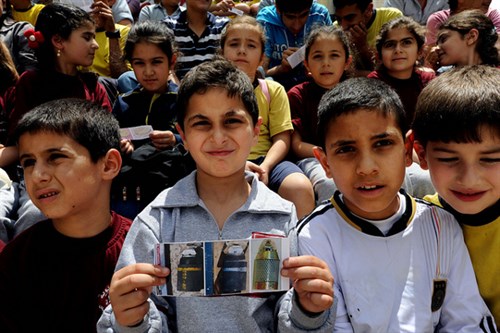12 August 2014
Lebanon Cluster Bomb Legacy Highlights Treaty Relevance in lead-up to Fifth Meeting of States Parties
This week the Cluster Munition Coalition (CMC) remembers those killed and injured during Israeli cluster bomb strikes on Lebanon eight years ago, and in the years since, and urges all governments that have not yet done so to join the Convention on Cluster Munitions without delay.
 As part of Mine Risk Education (MRE), students from a school in Nabatieh, Lebanon are given various photos of different cluster bombs and mines. ©CMC
As part of Mine Risk Education (MRE), students from a school in Nabatieh, Lebanon are given various photos of different cluster bombs and mines. ©CMC
This week the Cluster Munition Coalition (CMC) remembers those killed and injured during Israeli cluster bomb strikes on Lebanon eight years ago, and in the years since, and urges all governments that have not yet done so to join the Convention on Cluster Munitions without delay.
In July until August 2006 Israel fired cluster munitions containing an estimated 4.6 million submunitions into south Lebanon, with devastating and long lasting consequences for innocent civilians. The majority of bombs were dropped in the last three days of the conflict, before the ceasefire came into effect on 14 August.
Some 400 casualties have been recorded in Lebanon since the 2006 strikes as unexploded submunitions continue to kill and injure civilians. One year ago this week, an 18-year-old was reported killed by an unexploded submunition while working on a farm in South Lebanon.
The on-going use of cluster munitions by Syria during the past two years is sowing a similar deadly legacy in that country and lessons must be learned from the terrible legacy of cluster munition use.
“The horrific impact of large-scale cluster bomb use in Lebanon in 2006 helped generate support for urgent humanitarian action leading to the Oslo Process which resulted in the Convention on Cluster Munitions.. This life-saving treaty is the only way to safeguard citizens from the longstanding and horrific effects of these indiscriminate weapons. States must join now,” said Sarah Blakemore, Cluster Munition Coalition Director.
Since 2006, Lebanon has actively championed the Convention on Cluster Munitions, holding the presidency of the convention’s Second Meeting of States Parties in 2011.
Three weeks from now, Costa Rica will host the Fifth Meeting of States Parties to the Convention on Cluster Munitions and governments are being urged to attend the meeting and to loudly voice their commitment to the global ban. An official delegation from Lebanon is expected to participate in the San José meeting.
For more photographs & testimonies on the impact of cluster bombs and landmines in Lebanon, take a look at the photo gallery ICBL-CMC member organisation and clearance operator, Mines Advisory Group (MAG).


